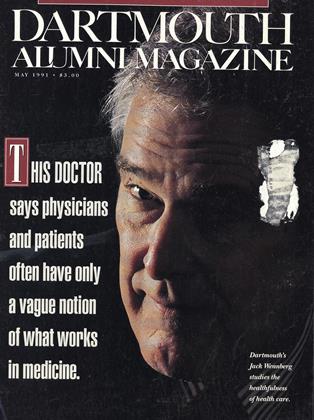"We thought of ourselves as living in a post-heroic age, a time not of heroes but of anti-heroes."
As i pass students walking across campus, I often think of myself when I was a student, uncertain of what my calling in life might be, yearning for a great cause on which to focus my energies.
My own college years were during the Eisenhower administration. A pervasive grayness hung over us a fine silt of ennui that filtered into our dreams and dimmed our inchoate aspirations. We thought of ourselves as living in a post-heroic age, a time not of heroes but of anti heroes-diminished, Kafkaesque figures whose brooding alienation and misunderstood sensitivities expressed the shrinking limits of the human condition. We saw our world reflected in T.S. Eliot's TheWaste Land and The Hollow Men. Our novelists were Albert Camus and J. D. Salinger; our filmmakers, Ingmar Bergman and Francois Truffaut; our playwrights, Samuel Beckett and Edward Albee; our philosophers, Reinhold Niebuhr and Jean-Paul Sartre. Looming over us as a popular icon was the tormented figure of James Dean, the "Rebel Without a Cause."
Yet in spite of our detached style and passive demeanor, many of us cherished a deep longing for genuine heroes, leaders with unifying visions, who would energize our imaginations and imbue our individual lives with a larger purpose. As Bernard Malamud wrote in The Natural, his haunting fable of a superachieving baseball star: "Without heroes, we're all plain people and don't know how far we can go."
Today's students have, if anything, even more misgivings about the concept of heroism than my generation had. But the fact remains that some lives are so wisely focused, so humanely directed, that they elevate those who study them. We need the example of men and women who, by their actions and achievements, inspire emulation; who, by the conduct of their lives, give distinctive and concrete form to their highest ideals.
Let me tell you about one person whose life and work made her an exemplar for me: Eudora Welty I first encountered her work when I was an undergraduate. Her greatness as a writer rests, in large measure, on the intensity of her experiences and observations, as both a southerner and a woman. In work after work Welty brings into the mainstream of our awareness the overlooked, the undervalued, and the marginal.
Her work is in the great tradition of Jane Austen, characterized by a wickedly playful wit, an exquisite ear for dialogue, a nuanced sensitivity to the small, everyday dramas of shy courtships and polite insults, and most of all by the universe of meaning that is revealed in the mundane fortunes of a single household.
The source of Welty's subde powers of observation, compassion, and insight remains a mystery of the kind with which creative people so often confound us. In her own account of her origins as an artist, Welty has said only, "My imagination takes its strength and guides its direction from what I see and hear and learn and feel and remember of my living world. But I was to learn slowly that both these worlds, outer and inner, were different from what they seemed to me in the beginning."
With grace and energy, Eudora Welty has taught us that we have worlds to learn from a woman who has never married, who has rarely traveled, and who still lives in her childhood home. Welty developed her private self even as she observed and engaged the public world. As she explains in the closing words of her literary autobiography, "A sheltered life can be a daring life as well. For all serious daring starts from within."
This essay was adapted from last September's convocation address.
 View Full Issue
View Full Issue
More From This Issue
-
 Cover Story
Cover StoryDOCTOR WENNBERG'S UNCERTAINTY PRINCIPLE
May 1991 By Susan Dentzer '77 -
 Feature
FeatureTHE BLUE ZOO
May 1991 By Robert Eshman '82 -
 Feature
FeatureStory Time
May 1991 By Nancy Millichap Davies -
 Article
ArticleDR. WHEELOCK'S JOURNAL
May 1991 By "E. Wheelock" -
 Article
ArticleTHEATERS OF WAR
May 1991 By Professor Lynda Boose -
 Class Notes
Class Notes1980
May 1991 By Michael H. Carothers
James O. Freedman
-
 Article
ArticleTHE PROFESSOR'S LIFE
FEBRUARY 1991 By James O. Freedman -
 Article
ArticleA ROBUST INTELLECTUAL
APRIL 1991 By James O. Freedman -
 Article
ArticleA New Dartmouth Tradition
June 1993 By James O. Freedman -
 Article
ArticleWorries of a President
May 1994 By James O. Freedman -
 Article
ArticleThe Time Allotted Us
June 1994 By James O. Freedman -
 Feature
FeatureAn Honor, To a Degree
Sept/Oct 2002 By JAMES O. FREEDMAN
Article
-
 Article
ArticleOTHER! TRUSTEE ACTION
January, 1911 -
 Article
ArticleAlumni Council Establishes National Enrollment Group
March 1954 -
 Article
ArticleLazarus Heads School Study
March 1960 -
 Article
ArticleFaculty planning report calls for pay hike
JANUARY/FEBRUARY • 1987 -
 Article
ArticleLet It Snow!
Jan/Feb 2011 -
 Article
ArticleThe Big Red Rolfe '31
May 1937 By RUEL N. COLBY '27

